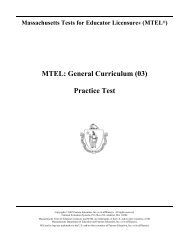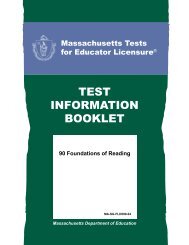MTEL Communication and Literacy Skills (01) Practice Test
MTEL: Communication and Literacy Skills (01) Practice Test - MTELs
MTEL: Communication and Literacy Skills (01) Practice Test - MTELs
- No tags were found...
Create successful ePaper yourself
Turn your PDF publications into a flip-book with our unique Google optimized e-Paper software.
<strong>Communication</strong> <strong>and</strong> <strong>Literacy</strong> <strong>Skills</strong> (<strong>01</strong>) <strong>Practice</strong> <strong>Test</strong>: ReadingRead the passage below, written in the style of a college history textbook.Then answer the five questions that follow.A Bill of Rights1 As members of the ConstitutionalConvention completed their work inPhiladelphia during the fall of 1787, they hadgood reason to be proud of what they hadaccomplished. Despite serious divisions overquestions of representation <strong>and</strong> related issues,they had managed to fashion a new form ofgovernment—one that would enable theUnited States to become the great nationthey believed it to be. This achievementnotwithst<strong>and</strong>ing, they knew they could notbecome complacent, for one task stillremained. The new government had to beratified by at least nine of the thirteen states,<strong>and</strong> not everyone outside the Philadelphiaconvention hall shared the founders' positiveview of their creation.2 The main opponents of the newgovernment formed a group known as theAnti-Federalists. Unlike proponents of theConstitution, most of whom hailed from urbancenters <strong>and</strong> prosperous rural areas, the bulkof Anti-Federalist support came from smallfarmers who had a deep fear of centralizedpower. As they saw it, the new governmentrepresented a betrayal of revolutionary ideals<strong>and</strong> posed as grave a threat to Americanliberty as the British monarchy once had. Inmaking their case against the Constitution,Anti-Federalist orators drew numerousparallels between the Loyalists who hadbacked Great Britain in 1776 <strong>and</strong> the politicalleaders now calling for a stronger federalgovernment. In each case, they claimed, onecould detect the plots <strong>and</strong> intrigues of selfinterestedindividuals who had no qualmsabout submerging "every worthy principlebeneath the shrine of ambition."3 Apart from these general objections, theAnti-Federalists found several features of theConstitution particularly troubling. One wasthe power of Congress to raise st<strong>and</strong>ing armiesduring peacetime. This, they feared, wouldresult in the formation of a mercenary armywhose only loyalty was to the powerfulofficials who had created it. Another set ofobjections centered on the taxing power of thenew government. Given the broad grant ofauthority made to Congress, they asked, whyshould it act any differently in this regard thanParliament had? As Patrick Henry observed,nothing in the Constitution preventedgovernment officials from exploiting thetaxpaying public. The Virginia orator thenwent on to sketch a frightening picture ofan all-powerful president "supported inextravagant magnificence" by corruptlegislators capable of "laying what taxesthey please, giving themselves what salariesthey please, <strong>and</strong> suspending our laws at theirpleasure."4 The Anti-Federalists were also concernedabout the place of the states in the new systemof government. According to traditionalpolitical theory, sovereignty was indivisible.This meant that lesser governmental bodiescould not effectively share power with acentral authority. Anti-Federalists feared thatindividual states would have insufficientpower to order their own affairs under the newframe of government. They further noted thatthe Constitution did not contain a bill of rights.This, they believed, was no oversight on thepart of the framers, but reflected their generaldisdain for the liberties of American citizens.10
















